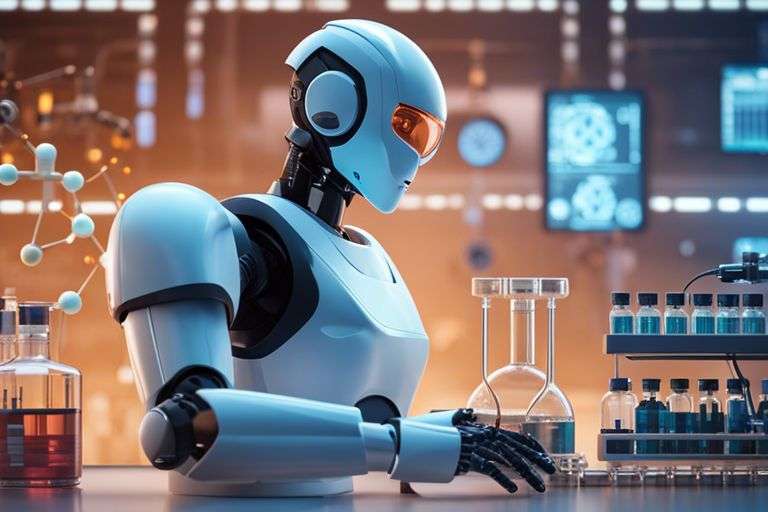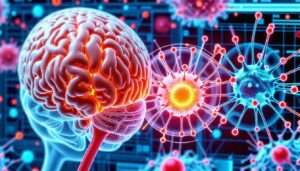Embrace the future of drug discovery with the help of artificial intelligence (AI). As technology continues to advance, the use of AI in drug discovery has the potential to revolutionize the field. By harnessing the power of AI, researchers are able to analyze massive amounts of data in a fraction of the time it would take using traditional methods. This has the potential to accelerate the discovery and development of new drugs, leading to faster treatments for a variety of diseases. In fact, AI has already shown promising results in identifying new drug candidates and repurposing existing drugs for new uses. To learn more about the role of AI in drug discovery and its clinical relevance, check out this article on AI in drug discovery and its clinical relevance – PMC.
Key Takeaways:
- Accelerated Drug Discovery: AI has the potential to significantly speed up the drug discovery process by analyzing massive amounts of data and identifying potential drug candidates more efficiently.
- Precision Medicine: AI can help researchers identify specific patient populations that may benefit from certain drugs, leading to the development of more targeted and personalized treatments.
- Identifying Novel Drug Targets: By analyzing complex biological data, AI can uncover novel drug targets that may have been previously overlooked by traditional methods, leading to the discovery of new drugs for various diseases.
- Reduced Cost and Risk: AI can help reduce the cost and risk associated with drug discovery by minimizing the need for costly trial-and-error experiments and guiding researchers towards more promising drug candidates.
- Drug Repurposing: AI can analyze existing drugs and identify potential new uses for them, allowing for the repurposing of drugs to treat different diseases, saving time and resources in the drug development process.
Core Technologies in AI-Driven Drug Discovery
If you are looking to dive into the world of AI-driven drug discovery, it is crucial to familiarize yourself with the core technologies that drive this innovative field. These technologies are revolutionizing the drug discovery process, making it more efficient, cost-effective, and ultimately, leading to the development of novel, life-saving medications. The two key technologies at the forefront of AI-driven drug discovery are Machine Learning and Deep Learning, as well as Data Mining and Predictive Analytics. Let’s explore each of these core technologies in detail to understand their impact on drug discovery.
Machine Learning and Deep Learning
Machine Learning and Deep Learning algorithms have become pivotal in drug discovery by enabling computers to analyze large datasets and identify patterns that humans may overlook. These algorithms can learn from vast amounts of molecular and clinical data, ultimately assisting in predicting potential drug candidates, understanding disease mechanisms, and even optimizing clinical trial designs. Moreover, with the ability to process and understand complex biological interactions, Machine Learning and Deep Learning have the potential to dramatically accelerate the drug discovery process, leading to the identification of promising therapeutics in a fraction of the time it would take using traditional methods. As a result, this technology is a game-changer in the pharmaceutical industry, revolutionizing the way drugs are discovered and developed.
Data Mining and Predictive Analytics
Data Mining and Predictive Analytics play a crucial role in drug discovery by extracting valuable insights from large, diverse datasets. By analyzing complex biological data and integrating it with clinical, genetic, and environmental information, these technologies can identify potential drug targets, predict drug responses, and even anticipate adverse reactions. Through data mining, you can uncover hidden correlations and biomarkers that may lead to the discovery of new treatments or personalized medicines tailored to individual genetic profiles. The predictive power of these technologies not only expedites the drug discovery process but also minimizes the risk of failed drug development, ultimately saving you time and resources. With the ability to analyze vast amounts of data, Data Mining and Predictive Analytics are powerful tools in your quest to discover groundbreaking therapies.
By leveraging Machine Learning, Deep Learning, Data Mining, and Predictive Analytics, you can harness the potential of AI-driven drug discovery, leading to the development of innovative medications that address unmet medical needs and improve patients’ lives. Always remember, staying informed about the latest advancements in AI technologies is vital in shaping the future of drug discovery and healthcare.
Applications of AI in Drug Discovery
The potential of AI in drug discovery is vast and varied, with the ability to impact several stages of the drug development process. In this chapter, you will learn about the different applications of AI in drug discovery and how they are revolutionizing the pharmaceutical industry.
Target Identification and Validation
The use of AI in target identification and validation has drastically improved the efficiency and success rate of drug discovery. With the help of AI algorithms, you can analyze massive datasets and identify potential drug targets with unprecedented speed and accuracy. By utilizing AI, you can significantly reduce the time and resources required for target validation, ultimately accelerating the drug development process. Additionally, AI can provide valuable insights into the complex biological pathways involved in disease, helping you identify the most promising drug targets for further investigation.
Compound Screening and Optimization
AI plays a crucial role in compound screening and optimization by streamlining the process of identifying potential drug candidates. Through the use of machine learning algorithms, you can quickly analyze the biological activity and properties of compounds, allowing you to prioritize the most promising candidates for further development. AI also helps in optimizing the chemical structure of compounds to improve their efficacy and minimize potential side effects, ultimately increasing the likelihood of success in preclinical and clinical trials.
Challenges and Limitations
To fully grasp the potential of AI in drug discovery, it’s essential to acknowledge the challenges and limitations that come with it. Although AI has proven to be a powerful tool, there are several hurdles that you must consider along the way.
Data Quality and Integration Issues
When it comes to drug discovery, the quality and integration of data pose significant challenges. The vast amount of data available from various sources, such as clinical trials, research studies, and pharmaceutical companies, can often be inconsistent and not easily integrated. This can lead to issues in generating reliable predictions and insights. Additionally, the quality of the data is crucial, as inaccuracies or biases can significantly impact the outcomes of AI algorithms. Ensuring the accuracy, completeness, and relevance of the data you are working with is a fundamental challenge that must be addressed.
Ethical and Regulatory Considerations
As you delve into the realm of AI in drug discovery, you will inevitably encounter ethical and regulatory considerations. The use of AI in healthcare and pharmaceuticals raises complex ethical questions surrounding patient privacy, consent, and the responsible use of data. Furthermore, the regulatory landscape for AI in drug discovery is continually evolving, and navigating the complex web of regulations and guidelines can be daunting. It’s essential to stay abreast of ethical principles and regulatory requirements to ensure that your use of AI is both responsible and compliant with the law.
Future Perspectives
Now, as we look towards the future of AI in drug discovery, it’s evident that we are only scratching the surface of its potential. The integration of AI with drug discovery is expected to revolutionize the pharmaceutical industry, paving the way for more targeted and efficient drug development processes. If you want to learn more about how AI is tapping into the drug discovery potential, you can read this article on Tapping into the drug discovery potential of AI.
Advancements in AI Algorithms
Advancements in AI algorithms, including machine learning and deep learning, have significantly enhanced the capabilities of AI in drug discovery. The ability of AI to process and analyze vast amounts of biological and chemical data in a short time frame is unprecedented. This, in turn, allows for the rapid and accurate prediction of potential drug candidates, significantly accelerating the drug development process. The potential for AI to identify novel drug targets and predict their efficacy with high precision has been a game-changer in the field of drug discovery.
Integration with Personalized Medicine and Genomics
The integration of AI with personalized medicine and genomics has the potential to revolutionize the way we approach drug discovery and development. By leveraging AI to analyze individual patient data and genetic information, pharmaceutical companies can develop targeted therapies tailored to an individual’s unique genetic makeup. This shift towards personalized medicine not only enhances treatment efficacy but also minimizes adverse drug reactions. AI’s ability to analyze complex genomic data and identify personalized treatment options has the potential to significantly improve patient outcomes and overall healthcare.
The Potential of AI in Drug Discovery
Hence, as you can see, the potential of AI in drug discovery is immense. With the ability to analyze vast amounts of data and identify potential drug candidates that may have been overlooked by traditional methods, AI has the power to revolutionize the pharmaceutical industry. By leveraging machine learning and predictive modeling, you can greatly accelerate the drug discovery process and ultimately bring life-saving treatments to market more quickly. Embracing AI in drug discovery has the potential to lead to new breakthroughs and advancements in medicine that can benefit individuals and society as a whole.
FAQ
Q: What is the potential of AI in drug discovery?
A: AI has the potential to significantly speed up the drug discovery process by analyzing large datasets, predicting drug-target interactions, and identifying potential drug candidates with higher accuracy.
Q: How does AI contribute to drug discovery?
A: AI contributes to drug discovery by using algorithms to process and analyze biological data, identify promising drug candidates, and predict their efficacy and safety profiles.
Q: What are some key benefits of using AI in drug discovery?
A: Some key benefits of using AI in drug discovery include faster identification of potential drug candidates, reduced costs and resources, and the ability to explore a wider range of potential drug targets and molecular pathways.
Q: What are the challenges of using AI in drug discovery?
A: Challenges of using AI in drug discovery include the need for high-quality data, validation of computational predictions, and the integration of AI algorithms into established drug development processes.
Q: What is the future of AI in drug discovery?
A: The future of AI in drug discovery holds promise for personalized medicine, targeted therapies, and the development of new treatments for currently incurable diseases. Continued advancements in AI technology and increased collaboration between researchers and industry are expected to drive further innovation in this field.




